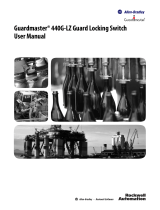
4
2 Safety instructions
• Follow the operating instructions�
• Improper use may result in malfunctions of the unit� This can lead to personal
injury and/or damage to property during operation of the machine� For this rea-
son note all remarks on installation and handling given in this document� Also
adhere to the safety instructions for the operation of the whole installation�
• In case of non-observance of notes or standards, especially when tampering
with and/or modifying the unit, any liability and warranty is excluded�
• If the sensor is damaged, the function cannot be guaranteed�
• Errors caused by damage cannot be detected by the sensor�
• The unit must be installed, connected and put into operation by a qualified
electrician trained in safety technology�
• The applicable technical standards for the corresponding application must be
complied with�
• For installation the requirements according to EN 60204 must be observed�
• The sensor and the actuator must be in perfect condition and regularly tested
by qualified personnel (person trained in safety matters)�
• In case of malfunction of the unit please contact the manufacturer� Tampering
with the unit is not allowed�
• Disconnect the unit externally before handling it� Also disconnect any inde-
pendently supplied relay load circuits�
• After installation, maintenance or repair of the device, perform a complete
function check� (→ 10 Maintenance, repair and disposal)�
• Only use the unit under the specified operating conditions (→ 9 Technical data)�
In case of special operating conditions please contact the manufacturer�
• Use only as described below (→ 4)�
2.1 Safety-related requirements regarding the application
It must be ensured that the safety requirements of the respective application
correspond to the requirements stated in these instructions�













